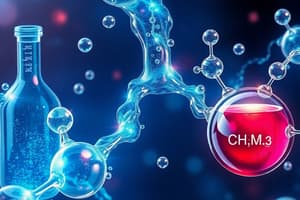Podcast
Questions and Answers
What makes carbon unique in organic chemistry?
What makes carbon unique in organic chemistry?
- Its distinctive color in compounds
- Its high reactivity with oxygen and nitrogen
- Its ability to form four chemical bonds per atom (correct)
- Its presence in all organic molecules
What is the role of functional groups in organic chemistry?
What is the role of functional groups in organic chemistry?
- Provide energy to the molecules
- Control the color of the compounds
- Influence how molecules react and behave (correct)
- Determine how molecules bond with metals
What is a fundamental principle of organic chemistry regarding functional groups?
What is a fundamental principle of organic chemistry regarding functional groups?
- They determine how molecules interact, react, and behave (correct)
- They only affect the physical state of molecules
- They are purely aesthetic features of molecules
- They have no impact on molecule interactions
Which type of chemical reactions are involved in synthesizing new organic chemicals?
Which type of chemical reactions are involved in synthesizing new organic chemicals?
What is the significance of carbon's ability to participate in chains and rings in organic molecules?
What is the significance of carbon's ability to participate in chains and rings in organic molecules?
How do sp hybrid orbitals enable carbon to form diverse organic compounds?
How do sp hybrid orbitals enable carbon to form diverse organic compounds?
What is the role of nuclear magnetic resonance spectroscopy (NMR) in organic chemistry?
What is the role of nuclear magnetic resonance spectroscopy (NMR) in organic chemistry?
Why is mass spectrometry (MS) important in organic chemistry?
Why is mass spectrometry (MS) important in organic chemistry?
What is a key purpose of structural elucidation techniques in organic chemistry?
What is a key purpose of structural elucidation techniques in organic chemistry?
How do chemists benefit from linking bioactivity data with chemical structures?
How do chemists benefit from linking bioactivity data with chemical structures?
In organic chemistry, what are some applications of the molecules studied by chemists?
In organic chemistry, what are some applications of the molecules studied by chemists?
What drives the field of organic chemistry according to the text?
What drives the field of organic chemistry according to the text?
Flashcards are hidden until you start studying
Study Notes
Exploring Organic Chemistry's Fascinating World
Organic chemistry occupies a unique position within the scientific landscape due to its focus on carbon compounds found abundantly throughout nature and life itself. This discipline is grounded in the study of organic molecules – those containing carbon atoms bonded with hydrogen, oxygen, nitrogen, sulfur, phosphorus, and other elements in various structures. Let's dive into some key concepts and applications of this intriguing field.
Carbon Atoms and Their Bonding Patterns
Carbon provides organic chemists with versatility unmatched by any other element; it can form four chemical bonds per atom through single covalent connections known as sp hybrid orbitals. These strong yet flexible links allow carbon to participate in chains, rings, and complex branching patterns, resulting in the vast number of distinct organic molecules we see today. One fundamental principle of organic chemistry involves recognizing different classes of functional groups – specific atomic arrangements that determine how these molecules interact, react, and behave when subjected to catalysts, energy input, or environmental conditions.
Synthesis, Reaction Mechanisms, and Functionality
The core processes involved in synthesizing new organic chemicals revolve around building up or breaking down molecular structures via reactions such as nucleophilic substitution, electrophilic aromatic substitution, elimination, addition, and condensation. By manipulating reaction mechanisms and understanding their underlying principles, chemists can create novel organic compounds with desired properties and functions, extending our knowledge of structure–property relationships and providing insights into biological systems. Some of the most well-known examples from organic chemistry include aspirin, nylon, penicillins, vitamins, and anticancer drugs like paclitaxel.
Structural Elucidation Techniques
With thousands upon thousands of potential organic molecules to investigate, chemists need efficient methods for identifying unknown compounds and characterizing them beyond their empirical formulae. Several techniques play vital roles in structural elucidation: nuclear magnetic resonance spectroscopy (NMR) identifies protons and carbons based on their magnetic interactions with each other and external fields; mass spectrometry (MS) gives information about a compound's fragmentation pattern; and chromatography separates components based on physical differences like polarity, size, or affinity towards stationary phases. Advanced analytical tools often enable researchers to link bioactivity data with chemical structures, thus facilitating drug discovery efforts.
Biological Interactions and Applications
Many of the molecules studied by organic chemists directly impact living organisms, either acting as essential nutrients or contributing to biochemical pathways critical for survival. Understanding the behavior of these compounds in cells has given rise to innovative approaches toward pharmaceuticals, agrochemicals, materials science, and synthetic biology. In turn, further study clarifies aspects of natural product biosynthesis and offers opportunities for green chemistry practices aimed at minimizing waste during industrial manufacturing.
In summary, organic chemistry represents a multifaceted endeavor driven by curiosity about the world's diverse array of carbon-based molecules and their applications across disciplines. As you continue your exploration of this fascinating field, keep an open mind and prepare yourself for many captivating discoveries along the way!
Studying That Suits You
Use AI to generate personalized quizzes and flashcards to suit your learning preferences.




